Austin S. Camacho's Blog, page 7
June 19, 2018
Author First
 As the title of this blog attests, I often describe myself as a writing publisher. It’s an easy phrase, kind of rolls of the tongue. But only now, three weeks after leaving my full time federal position and picking up the label “retiree” do I realize the false implication of that phrase.
As the title of this blog attests, I often describe myself as a writing publisher. It’s an easy phrase, kind of rolls of the tongue. But only now, three weeks after leaving my full time federal position and picking up the label “retiree” do I realize the false implication of that phrase.“Writing publisher” sounds like someone who is a publisher who also writes. The problem here is that in my own head, I am a writer who also helps run a publishing company. The challenge for me is that things I do as a publisher are responsibilities. Other authors are counting on me to do those things that help their books be the best they can be, and then help their books get found by readers. The only drive to write is an internal pressure. It is far too easy to write “when there’s time” after everything else is done.
But this all started back in 1999 when a tiny company called Nitelinks published Blood and Bone not only in paper but this new idea – an electronic book. When they folded I published that book and Collateral Damage with Infinity Publishing using another new idea – Print On Demand. Yes, it was self-publishing, but it allowed me to prove that someone would pay to read my books. (Their classy URL was BuyBooksOnTheWeb.com)
Today with six novels in the Hannibal Jones series and five Stark & O’Brien thrillers there are people out there who actually ask for and anticipate the next novel. Beyond those series I wrote a well-received thriller called Beyond Blue which deserves a sequel. And I have ideas for three other novels that could be stand-alones or series depending on how they feel after I write them.
Which means I have to write them. I find publishing very rewarding but, to be honest, I write for the same reason I breathe. Because if I didn’t I would die (I’d love to take credit, but Isaac Asimov said it first,)
So, no matter what, I will carve an hour out of every day to write. Yes, I’m home now all day so I have lots of time: to work out, clean the house, check what’s on TV, wash the car, mow the lawn, feed the birds, and do actual writer stuff like my social media and writing this blog. BUT…
I’m digging in. And for those of you who are counting, I’m 52,107 words into the next untitled Hannibal Jones mystery. Based on my typical length that’s about 65% of a novel. I’ll be fishing for beta-readers soon and looking for help with the title.
So, when you see me posting here about publishing, marketing and conferences, don’t lose sight of the fact that first and foremost I’m a writer. Because I never do.
Published on June 19, 2018 11:38
June 10, 2018
Why Am I Here... Again?
Welcome back, strangers!
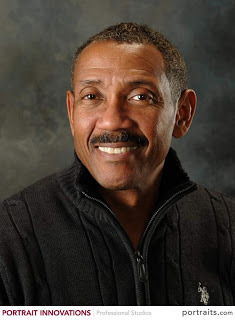
Yes, I know. I haven’t posted a blog in so long you may have forgotten I ever did. Seriously, it’s been like a year and a half. But now that I’ve retired from the day job I’m back. This will continue to be where I give you all a peek into the life of a writing publisher and wearing those two hats will more than fill my days.
So, as an author, and more, as a publisher, why do I think blogging is worth doing? Well… it’s business.
It’s very different than when blogging started before the turn of the century. Blogs used to be a platform to share your thoughts, feelings, opinions or experiences – an online journal or diary, usually with a small following of friends. Now it’s there are millions of blogs. Because it’s easy to start one anybody can declare themselves an expert or become an entertainer. For me and a lot of other writers, it’s an important way to contact readers and others in the writing industry.
Used correctly, a blog can increase traffic to your website. As a publisher, it’s also a way to reinforce my brand. Google’s algorithms focus on a website’s content and frequency of posts. Through my blog I can increase the number of inbound links that get people to our web site, and our popular Facebook page.
As a representative of Intrigue Publishing I need to establish myself as a publishing expert. The content I post on my blog will hopefully give readers the confidence to trust in our brand and trust my expertise.
So, blogging has moved from an individual hobby to an influential business tool. It helps a small publisher to compete with the big guys. Likewise, it helps new authors to build an audience and complete with the big names.
More personally, I have a lot of hard earned experience in this business. knowledge comes from experience, and experience comes from making dumb mistakes. YOU don't need to make all the same stupid moves I made in the past. So I’ll share what life is like for a writer trying to produce more and better prose, and for a publisher trying to get more and better novels into print, and a lot about what I've learned along the way.
I’ll be back next week to discuss my goals as an author. Then I’ll share my objectives as a small publisher. What it’s like doing business with a spouse. Then, I’ll get back into useful tips for writing short stories, writing novels, and marketing!
Stay tuned and let me know what YOU’D like me to talk about.
Published on June 10, 2018 04:19
December 27, 2016
Between Motion and Rest
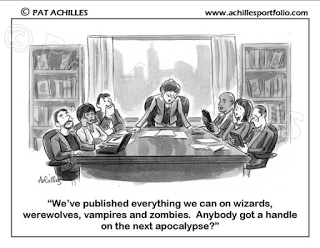 Christmas has slipped past, and many of my friends are lighting their second or third candle. So it’s officially vacation down time, after the gift exchange energy high and into the warm thoughtful days. But we are also rushing toward New Year’s Day, an annual time of introspection and planning which energizes us thinking of the future. So, what do you call that space between motion and rest?
Christmas has slipped past, and many of my friends are lighting their second or third candle. So it’s officially vacation down time, after the gift exchange energy high and into the warm thoughtful days. But we are also rushing toward New Year’s Day, an annual time of introspection and planning which energizes us thinking of the future. So, what do you call that space between motion and rest?This is the time we at Intrigue Publishing re-evaluate our business plan. Does our mission statement still clearly define our actual objective? Does our slogan (Writing that CAN’T be ignored) say the right thing? And have we clearly defined our genres so that authors know what to submit, and so that readers know what to expect when they pick up a book from Intrigue Publishing
How aggressively will we move more deeply into audio books, foreign rights, mass market paperbacks and other alternative income streams? Seeking out additional forms of publishing is expensive but can be the best way to serve our authors.
Is it wise to contract for series books as opposed to stand-alones? Can we build enough of an audience for one novel that they are eager to come back for more?
Do we want to attract a greater number of submissions? And if so, how long before we get swamped? Each manuscripts deserves due consideration. We never want to risk short changing a great book.
How much energy do we want to devote to hand sales events and conferences. These can be costly gambles but they do promote our brand and thus, our authors.
And speaking of our authors, to what extend do we want to tie them in to our marketing efforts? How can we best help them to make connections with book clubs around the country? Which social media efforts, giveaways, or contests will pay off for us all?
And there are purely administrative considerations. Can we refine our processes for calculating royalties, acquiring copyrights, maintaining the necessary tax records, capturing expenses and tracking sales (paper and the multiple ebook outlets)?
So in this ethereal space in between motion and rest, we here at Intrigue Publishing are putting a magnifying glass on our business plan and everything we do to try to find the best way to support our authors while bring the best possible novels to market.
Published on December 27, 2016 17:14
December 20, 2016
The Eternal Question: What to Read Next
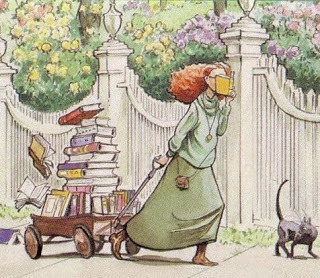 If you’re an avid reader, eventually you will come to a point when you become so aware of the broad ocean of published books in the universe that you may find yourself paralyzed by indecision. You want to read them all but can really only work on one at a time. From this vast collection of literature, how do you decide what to read next? I know that feeling. Let me suggest that the selection process should be based on some simple questions.
If you’re an avid reader, eventually you will come to a point when you become so aware of the broad ocean of published books in the universe that you may find yourself paralyzed by indecision. You want to read them all but can really only work on one at a time. From this vast collection of literature, how do you decide what to read next? I know that feeling. Let me suggest that the selection process should be based on some simple questions.What do I want to read? – What genres appeal to you? Maybe you’re a big-time mystery reader but you’ve wondered about sci-fi. This might be the time to give the new genre a spin.
Who do I want to read? – What authors have you enjoyed before? Maybe they have more books out there and a writer you’ve already liked is always a good bet.
Is there an unfinished series in your past? – Just about every fiction genre has notable series If you’ve read one or two and liked them, it might be fun to get the whole list and read thru the series. (If you choose the Hannibal Jones Mysteries or Stark & O’Brien thrillers message me and I’ll give you the list in order.)
What do you like to do? – many books may feature characters who share your hobbies or interests. Take a walk through your local library’s catalog using your hobby as a keyword and you may turn up some books you’ll enjoy.
What do you already have? – When I can’t decide on my next read I always review my own stacks. Sometimes I find a book I’d completely forgotten I had. That’s always a happy discovery, since I’ve already paid for that one.
What are others reading? – If your friends are readers you can usually get great recommendations from them. (If your friends are NOT readers, you need to find new friends.) Reading a book after a friend, sibling or parent read it has the hidden advantage of creating a great conversation starter and possibly greater bonding. (“What? You liked that one too? Who was your favorite character?)
What’s selling? – Stuck for the next good read I may check the USA Today or New York Times bestseller list. Sometimes I want to read the books that are making headlines just so I’m in the know. At the very least it helps you know what’s hot in popular culture.
Answering these questions should lead you to some great reads.
Published on December 20, 2016 12:37
December 10, 2016
The Best Gifts for Book Lovers
 This is the time of year when most of us begin the search for the perfect present. Today I’ll try to make it easier, at least for the avid readers on your list.
This is the time of year when most of us begin the search for the perfect present. Today I’ll try to make it easier, at least for the avid readers on your list.Naturally, I think the best gift for anyone is one of my novels. But what if your friend has already read all my books? The next step is a web site called Heavy.com. They’ve listed what they believe are the Top 10 Best Christmas Gifts for Book Lovers - starting with a cool shirt that proudly proclaims: “If I Can’t Take My Book I’m Not Going.”
But what if you have eleven friends? Buzzfeed is there for you with a list of 24 Insanely Clever Gifts for Book Lovers. I don’t know how insane they are, but I’m crazy about those floating bookshelves.
Amongst all these ideas don’t forget that books themselves are idea for under the tree or in a big stocking. They’re easy to wrap, inexpensive to mail (use media mail) and never go out of style. Plus there are no wires, no batteries are needed and there are no small pieces to pose a threat to small children.
The only time books might NOT be perfect is if your friends are authors themselves. That big stack of great ideas previously listed are mostly good for writers too, but if all else fails you can always turn to Amazon. You can search just about anything and they’ll gather the right things for you. I searched for “Gifts for Writers” and got several pages of cool options including a Writer’s Emergency Pack and a coffee mug that says, “Please Do Not Annoy the Writer, she may put you in a book and kill you.”
Finally, remember that you don’t need to spend a dime to give your published writer friends a wonderful gift. There’s nothing they’ll appreciate more than a nice review of their work, posted on Amazon or Goodreads. They’ll feel the love from that gesture as much as from anything you can wrap and put under their tree.
Published on December 10, 2016 13:16
November 21, 2016
6 Things This Small Press is Thankful For
As we slow things down for Thanksgiving week I want to express my appreciation for some of the people that keep our business moving forward and growing. This is what we at Intrigue Publishing are truly thankful for.
Our talented authors: Let’s face it, nothing happens until someone writes a great book. We read a lot of manuscripts and we never publish a book we just like or think is good. We have to be excited about that story, those characters and the prose style that brings it all together. Not every book we’ve published has become a big seller, but that hasn’t stopped us from loving every one. We have been privileged to read so many great books created by so many hugely talented writers.
A spectacular editor: Almost every book we’ve published has been touched by Melanie Rigney, a fine writer herself who brings a lot more than a finely honed sense of what makes a good and commercial novel. Melanie has a way of making a writer understand that she loves their book almost as much as they do, even as she explains in clear plain language how to make that good book into a great one. Several authors have thanked us for having Melanie help them refine both their book and their ability to write.
An amazing proofreader: commas go inside the quotation marks, a character’s hair should stay the same color throughout the book, and the Marine Corps emblem has a fouled anchor, not a fowled anchor (yep, that one was me.) Cynthia Lauth has one of the sharpest eyes in the business and she has saved us from uncounted moments of embarrassment. If you see a mistake in one of our books it is sure because for some reason we chose to ignore her input.
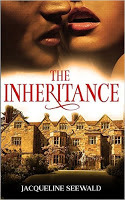
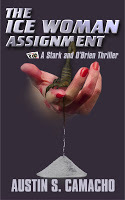 Phenomenal cover artists: No matter how great a book is, no one is going to pick it up to look inside unless the cover grabs them. Like any publisher we’ve made the occasional false start but in the end we’ve ended up with some incredibly good book covers – the kind other authors compliment us on. In particular Paul at Iconix has helped to create our thriller brand (check the new covers of the Stark & Obrien series) and Ryan Anderson (Look at the replacement cover of our new romance title THE INHERITANCE) knows how to make readers want to check a story out. Both these talents are able to create commercial work that doesn’t look like everyone else’s. We are so grateful to have found them.
Phenomenal cover artists: No matter how great a book is, no one is going to pick it up to look inside unless the cover grabs them. Like any publisher we’ve made the occasional false start but in the end we’ve ended up with some incredibly good book covers – the kind other authors compliment us on. In particular Paul at Iconix has helped to create our thriller brand (check the new covers of the Stark & Obrien series) and Ryan Anderson (Look at the replacement cover of our new romance title THE INHERITANCE) knows how to make readers want to check a story out. Both these talents are able to create commercial work that doesn’t look like everyone else’s. We are so grateful to have found them.
A fabulous distributor: It took us three years to establish ourselves well enough to be accepted by a national book distributor and how lucky we are that we found Small Press United (SPU) This subsidiary of the Independent Publishers Group (IPG) does more than push our books into bookstores across the continent. We have learned so much from their connections with the Independent Book Publishers Association (IBPA), the publishing industry's leading educational organization. And their sales force has offered valuable feedback about how titles, cover art and other factors impact their ability to place our books in stores. They are in large part the reason three of our titles are on IPG's bestseller lists this week. Like the people listed above, SPU is a valued partner that helps us move from success to success.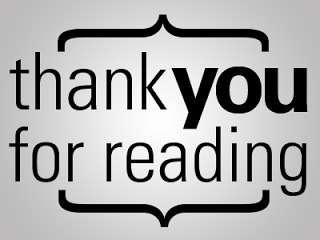 READERS: Despite the horror stories we all read at the turn of the century, people do still read books! And we are very thankful for every person who has ever purchased one of our novels. We are even MORE thankful for all those who have emailed or tweeted feedback to us, and those who have taken the time to post a review on Amazon or Goodreads. YOU are the people we do it all for, and if we give you a couple of hours of joy, of thrills, of intrigue, then we can feel that we did your job! So THANK YOU for reading. You are also our partners in this grand enterprise and we are eternally thankful for all the people we are connected to through the act of publishing what we hope are some of the most enjoyable novels you’ve ever read.
READERS: Despite the horror stories we all read at the turn of the century, people do still read books! And we are very thankful for every person who has ever purchased one of our novels. We are even MORE thankful for all those who have emailed or tweeted feedback to us, and those who have taken the time to post a review on Amazon or Goodreads. YOU are the people we do it all for, and if we give you a couple of hours of joy, of thrills, of intrigue, then we can feel that we did your job! So THANK YOU for reading. You are also our partners in this grand enterprise and we are eternally thankful for all the people we are connected to through the act of publishing what we hope are some of the most enjoyable novels you’ve ever read.
Our talented authors: Let’s face it, nothing happens until someone writes a great book. We read a lot of manuscripts and we never publish a book we just like or think is good. We have to be excited about that story, those characters and the prose style that brings it all together. Not every book we’ve published has become a big seller, but that hasn’t stopped us from loving every one. We have been privileged to read so many great books created by so many hugely talented writers.
A spectacular editor: Almost every book we’ve published has been touched by Melanie Rigney, a fine writer herself who brings a lot more than a finely honed sense of what makes a good and commercial novel. Melanie has a way of making a writer understand that she loves their book almost as much as they do, even as she explains in clear plain language how to make that good book into a great one. Several authors have thanked us for having Melanie help them refine both their book and their ability to write.
An amazing proofreader: commas go inside the quotation marks, a character’s hair should stay the same color throughout the book, and the Marine Corps emblem has a fouled anchor, not a fowled anchor (yep, that one was me.) Cynthia Lauth has one of the sharpest eyes in the business and she has saved us from uncounted moments of embarrassment. If you see a mistake in one of our books it is sure because for some reason we chose to ignore her input.

 Phenomenal cover artists: No matter how great a book is, no one is going to pick it up to look inside unless the cover grabs them. Like any publisher we’ve made the occasional false start but in the end we’ve ended up with some incredibly good book covers – the kind other authors compliment us on. In particular Paul at Iconix has helped to create our thriller brand (check the new covers of the Stark & Obrien series) and Ryan Anderson (Look at the replacement cover of our new romance title THE INHERITANCE) knows how to make readers want to check a story out. Both these talents are able to create commercial work that doesn’t look like everyone else’s. We are so grateful to have found them.
Phenomenal cover artists: No matter how great a book is, no one is going to pick it up to look inside unless the cover grabs them. Like any publisher we’ve made the occasional false start but in the end we’ve ended up with some incredibly good book covers – the kind other authors compliment us on. In particular Paul at Iconix has helped to create our thriller brand (check the new covers of the Stark & Obrien series) and Ryan Anderson (Look at the replacement cover of our new romance title THE INHERITANCE) knows how to make readers want to check a story out. Both these talents are able to create commercial work that doesn’t look like everyone else’s. We are so grateful to have found them.A fabulous distributor: It took us three years to establish ourselves well enough to be accepted by a national book distributor and how lucky we are that we found Small Press United (SPU) This subsidiary of the Independent Publishers Group (IPG) does more than push our books into bookstores across the continent. We have learned so much from their connections with the Independent Book Publishers Association (IBPA), the publishing industry's leading educational organization. And their sales force has offered valuable feedback about how titles, cover art and other factors impact their ability to place our books in stores. They are in large part the reason three of our titles are on IPG's bestseller lists this week. Like the people listed above, SPU is a valued partner that helps us move from success to success.
 READERS: Despite the horror stories we all read at the turn of the century, people do still read books! And we are very thankful for every person who has ever purchased one of our novels. We are even MORE thankful for all those who have emailed or tweeted feedback to us, and those who have taken the time to post a review on Amazon or Goodreads. YOU are the people we do it all for, and if we give you a couple of hours of joy, of thrills, of intrigue, then we can feel that we did your job! So THANK YOU for reading. You are also our partners in this grand enterprise and we are eternally thankful for all the people we are connected to through the act of publishing what we hope are some of the most enjoyable novels you’ve ever read.
READERS: Despite the horror stories we all read at the turn of the century, people do still read books! And we are very thankful for every person who has ever purchased one of our novels. We are even MORE thankful for all those who have emailed or tweeted feedback to us, and those who have taken the time to post a review on Amazon or Goodreads. YOU are the people we do it all for, and if we give you a couple of hours of joy, of thrills, of intrigue, then we can feel that we did your job! So THANK YOU for reading. You are also our partners in this grand enterprise and we are eternally thankful for all the people we are connected to through the act of publishing what we hope are some of the most enjoyable novels you’ve ever read.
Published on November 21, 2016 11:18
October 25, 2016
What's next for Ebooks?
At one time a lot of people I knew thought that ebooks would replace paper books completely. While I still see no sign of that ever happening, it is true that ebook have the potential to evolve in ways that our beloved dead tree editions can’t, and can offer new marketing options as well. In so doing they may find new audiences.For example, a company called Neoglyphic Entertainment has created a platform that lets publishers create enhanced multimedia ebooks. The idea is to enhance the book’s storytelling capacity. Will motion graphics and a musical score improve the reading experience? Could be. At the very least I think a lot of people will want to give it a try. It’s true that enhanced e-books and apps with sound and video have not been well received by readers in the past, but Neoglyphic has assembled focus groups to help direct their efforts to create new experiences around traditional storytelling. The company plans to offer its multimedia platform as a for-pay service to publishers. As a demonstration they published Sunborn Rising: Beneath the Fall, an illustrated middle grade fantasy series. The series (in Kindle but also hardcover and trade paperback) follows an elf-like civilization facing environmental doom.
In other news, Indie authors who use Smashwords to distribute their ebooks may want to check their new service – Smashwords Alerts. This service automatically lets readers know about new releases from their favorite authors. To track an author, readers just go to the author profile page at Smashwords and click the button labeled, "Subscribe to Author Alerts." When the author releases a new book, readers will receive an alert. If a book is on preorder, readers will receive the alert the day the book goes on sale. And Smashwords says they maintain a strict email privacy policy, so readers’ email addresses remains private and are never shared with anyone. To get the most out of the new feature, writers would encourage their readers to subscribe to alerts so they never miss another new release. Authors can track the number of subscribers and "favorites" in real time from the Smashwords Dashboard. Ebooks may or may not be the future of reading, but they do offer more options in presentation and marketing than any other publishing choice.
Published on October 25, 2016 19:32
October 8, 2016
The Case of the Vanishing Detectives
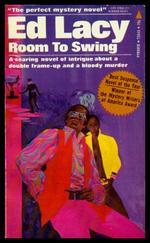 When I decided to write a hardboiled detective series I did what most fiction writers do. I set out to explore my detective’s predecessors, the characters he’d be compared to when he made his appearance.
When I decided to write a hardboiled detective series I did what most fiction writers do. I set out to explore my detective’s predecessors, the characters he’d be compared to when he made his appearance.That turned out to require a lot less time than I expected it to. As a hardboiled detective with an African heritage, Hannibal Jones turned out to have few predecessors. The best known black mystery characters, chronicled by Walter Mosley, James Patterson, Chester Himes and Hugh Holton, are policemen or amateur sleuths.
So where are all the men of color following in Phillip Marlowe’s gumshoe footsteps? Ed Lacy introduced the first credible African-American private eye, Toussaint Moore, in 1957. He won an Edgar, but no one followed his
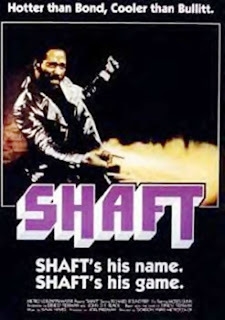 lead. I assumed that John Shaft would turn the tide when he appeared in 1971. Ernest Tidyman's Harlem private eye was so hardboiled that at the time my friends and I jokingly referred to him as “Sam: Spade Detective.” Yet despite his film success, there was no rush of imitators. All the African American private eyes seem to have vanished mysteriously.
lead. I assumed that John Shaft would turn the tide when he appeared in 1971. Ernest Tidyman's Harlem private eye was so hardboiled that at the time my friends and I jokingly referred to him as “Sam: Spade Detective.” Yet despite his film success, there was no rush of imitators. All the African American private eyes seem to have vanished mysteriously. I can hear all the Caucasian authors out there now, shaking their heads and muttering, “Don’t blame me.” Well, why not? African American authors write white characters all the time, so why not reverse that spin. And white authors don’t seem to have any trouble writing black characters as sidekicks, or villains. Why not write them as detectives?
Of course, there is the danger of stereotyping. Your ethnic readers will look very closely at any characters you introduce who don’t look like you. So how do you get it right when you’re writing about people from another race and culture? Here are three hints that will help you.
Observe: spend time in the grocery stores, restaurants and bars filled with mostly faces of color. Don’t worry, no one will assault you as long as you mind your own business. And by listening closely you’ll get a feel for the attitudes and interests of that group, not to mention their food and drink preferences. You will also develop a feel for the rhythm of language and common phrases they use. I’ve found this works for Latin, Korean and Iranian characters too.
Avoid dialect: When we change the way words are spelled to imitate the sound of someone’s voice we not only insult them, we make it harder for readers to get through our writing. All you need to do to get the dialog perfect is to use the words your characters would use in their own unique order. Your reader will “hear” what you meant, be it North Dakota Swedish or inner city black.
Get a reality check: First, make a black friend. Next, have that friend read your work and beg them to be honest in their feedback. Watch their face as they read. Ask them to test the dialog aloud, and listen for changes they may make unconsciously. If your friend balks at something, don’t debate it, change it.
The most important thing, of course, is to remember that we are all more alike than different. Human motivations, desires, fears and joys are universal, so make sure your black characters are first and foremost human.
And in case you’re skeptical about writing a black detective, you should know that Toussaint Moore’s creator, Ed Lacy, was actually a white guy named Leonard Zinberg.
Published on October 08, 2016 17:35
October 5, 2016
8 Ways to turn up the suspense in your fiction
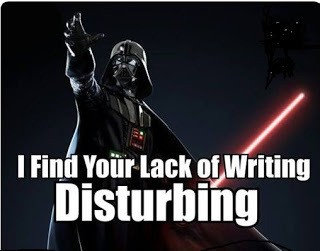 After sharing theory and concept, I figured I should share a few actual tips on how to keep the suspense building when you write. So here we go.
After sharing theory and concept, I figured I should share a few actual tips on how to keep the suspense building when you write. So here we go.1. Let the characters tell readers their plans. That doesn’t mean give away all the secrets. It means show the reader the characters’ agenda. Readers know something will go wrong because they know, on some level, that the story is about conflict. A bad guy hiding in the bushes is creepy, but how much stronger that scene would be if earlier we heard the good guy tell his girl, “I’ll meet you by the bushes at 6 o’clock.” Now we’re not only worried about him getting jumped, we also get to worry that she’ll see it, or that she might be the next victim.
2. Cut down on the violence. If you read my thrillers you might be surprised at how few actual fights there are. I think the more violence there is, the less it will mean. That’s why we don’t see all the fights Rocky has to go thru to get into the position to face Apollo Creed.
3. Always be one step ahead of your readers. As you write, keep asking yourself what your reader is hoping for or wondering about each point in the story. Your job is to give them what they want, when they want it – or maybe a little later than they want it – or to add a twist so you give them more than they bargained for. How do you do that?
4. As you develop your story, appeal to readers’ fears and phobias. Phobias are irrational fears. To be afraid of a tarantula is not a phobia, but to be afraid of all spiders is. Most people are afraid of helplessness in the face of danger. Many are afraid of needles, the dark, drowning, heights and so on. Think of the things that frighten you most, and you can be sure many of your readers will fear them as well.
5. Be sure to describe the setting of your story’s climax before you reach that part of the story. This is necessary to protect your pacing. So let someone visit it earlier and foreshadow everything you’ll need for readers to picture the scene when the climax arrives. Otherwise you’ll end up stalling out the story to describe the setting, when you should be pushing through to the climax.
6. Countdowns. Countdowns and deadlines can be helpful, but can work against you if they don’t feed the story’s escalation. For example, having every chapter of your book start one hour closer to the climax is a gimmick that gets old after a while because it’s repetitious and predictable—two things that kill escalation. Instead, start your countdown in the middle of the book. To escalate a countdown, shorten the time available to solve the problem.
7. Isolate your main character. As you rush toward the climax, remove his tools, escape routes and support system (helpers and defenders). This forces him to become self-reliant and makes it easier for you to put him at a disadvantage in his final confrontation with evil.
8. Make it personal. Don’t just have a person get abducted—let it be the main character’s son. Don’t just let New York City be in danger—let grandma live there.
Published on October 05, 2016 13:00
September 27, 2016
Top 10 Reasons to Attend the Creatures, Crimes and Creativity Con
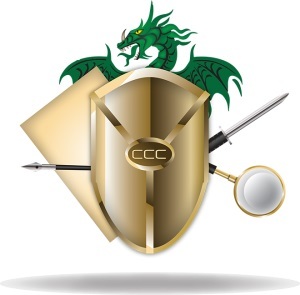 It has become an annual tradition! Every year at this time my blog is dedicated to explaining why every writer, aspiring author and avid van should be attending the Creatures, Crimes & Creativity (C3) Con this year. The C3 Con is the Mid-Atlantic’s book lover event of the year. And this year, we have two international bestselling authors as keynote speakers. But that’s only the beginning.
It has become an annual tradition! Every year at this time my blog is dedicated to explaining why every writer, aspiring author and avid van should be attending the Creatures, Crimes & Creativity (C3) Con this year. The C3 Con is the Mid-Atlantic’s book lover event of the year. And this year, we have two international bestselling authors as keynote speakers. But that’s only the beginning.We draw readers AND writers of genre fiction: horror, mystery, thriller, suspense, science fiction, fantasy and paranormal authors will gather in Columbia MD, Sep. 30-Oct 2.
So let’s count down the top ten reasons for attending the C3 Con:
#10 – FELLOWSHIP: Imagine being surrounded by avid readers and excellent writers for an entire 3-day weekend!
#9 – REED FARREL COLEMAN: Author of the heralded Moe Prager series and Jesse Stone novels, he’s been called our noir poet laureate. He’ll give a keynote address at dinner and teach a class.
#8 – ALEXANDRA SOKOLOFF: Known for her Huntress/FBI thrillers, her smooth blend of paranormal and crime fiction is some of the most original and unnerving work around. She will give the other dinner keynote talk and offer a one-woman class on writing for the screen.
#7 - MEALS: The registration fee ($275) includes five meals: Friday’s dinner, 3 meals Saturday and Sunday breakfast, so readers and writers dine side-by-side. One day registrations are available too, and that day's meals are included.
#6 - PANELS: Readers and fans will enjoy 36 panels and presentations from favorite authors, including the keynotes and local guests Donna Andrews (mystery) and Cerece Rennie Murphy (science fiction.)
#5 - GOODY BAGS - Each attendee will receive one filled with cool stuff, including free books (from Mulholland Books, Stark House Press, authors Alan Orloff and Debbi Mack, ) magazines (like Mystery Scene and Writers Digest,) our exclusive anthology filled with stories written by attending authors, and a flash drive from Smashword pre-loaded with ebooks.
#4 - TWITTER CONTEST: the attendee who tweets the most leading up to C3 using our hashtag (#MDC3Con) will get a new Kindle Fire.
#3 - FOR AUTHORS: EXPOSURE: Published authors get to spend time with their fans, and to expose new readers to their writing by presenting on one or two of the 36 panels. Their name and a link are posted on the C3 website. And they will be pictured in the C3 program book.
#2 - BOOK SIGNINGS: Novel Books provides an on-site bookstore and hosts two giant book signings, open to the public, featuring all the attending authors and their books. This is how people who don't actually attend can enjoy the C3 Con, both Friday and Saturday from 5pm to 6pm.
And the #1 best reason to attend the Creatures, Crimes & Creativity Con: BE A STAR: The Baltimore County library will shoot a video interview for as many authors as they have time for, and Diana Belchase will be there in person taping for a segment of her show, Book Smart TV!
You can still register, and get more details, at http://creaturescrimesandcreativity.com
Published on September 27, 2016 12:30



